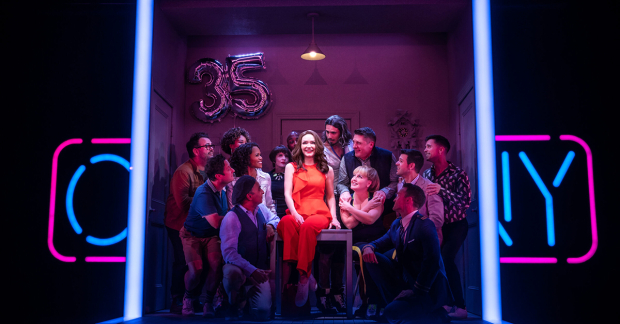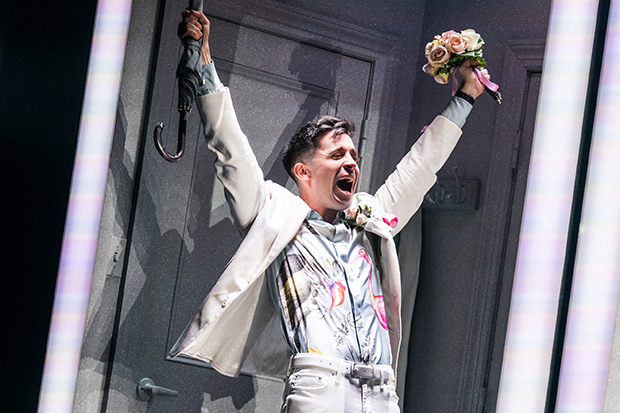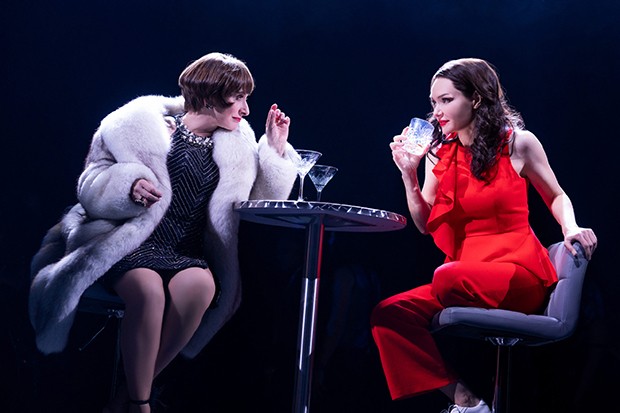Review: A Rousing Company Shows That Sondheim Was Still Innovating to the Very End

(© Matthew Murphy)
With the possible exception of Square One, his long-aborning Luis Buñel adaptation with playwright David Ives, the last Broadway show Stephen Sondheim personally had a hand in is Marianne Elliott's new revival of Company. Sondheim was at the first preview in March 2020, and there again in seat E1 at the second first preview in November 2021. He contributed lyric changes and offered textual advice on behalf of long deceased book writer George Furth. He even gave a rare and lengthy interview about it to the New York Times, conducted just a few days before his passing on November 26. To see the final production that Sondheim himself touched is reason enough to head to the Jacobs Theatre.
But Elliott's Company, which debuted several years ago on the West End and famously swaps the genders of several characters, is worth seeing for a lot of other reasons, too. Elliott has loaded her ensemble with Broadway's funniest comic actors, including Jennifer Simard and a pair of Christophers, Sieber and Fitzgerald. "Ladies Who Lunch" is delivered to the hilt by the only contemporary actor who truly owns that song, the inimitable Patti LuPone. And the changes, some of which work really well and some of which don't, are proof positive of Sondheim's belief that theater is a living creature, not a series of words printed in black and white. Simply put, this is the most fun I've ever had at this show.
Elliott's central concept — 35-year-old Manhattan bachelor Robert becomes 35-year-old Manhattan bachelorette Bobbie (beautifully played, if not always sung, by Band's Visit Tony winner Katrina Lenk) — was met with natural skepticism of the "How would that work?" variety. But this one simple alteration, and the domino effect it has on a series of other characters and situations, makes a show long viewed as a product of its time relevant again. Fifty years ago, it was about a bed-hopping playboy slowly discovering that there's more to love than physical intimacy. Now, it's about a woman keenly aware of what being that age means for her life and for her body (after all, doctors still refer to pregnancy over 35 as "geriatric"). No wonder she doesn't want to celebrate her birthday.

(© Matthew Murphy)
When the changes work, they enlighten the material even more significantly. The other most notable transposition is recasting Paul and Amy as gay couple Paul and Jamie (Etai Benson and Matt Doyle), whose wedding day may or may not be derailed by rain and a groom gone psychotic with doubt. Doyle's fabulous rendition of the tongue-twisting patter song "Getting Married Today" is a letter-perfect showstopper, with a tempo that allows you to truly savor the lyrics, as opposed to just being a display of speed and endurance. Bless this day, indeed.
Yet for all the contemporary flourishes Elliott and her team add, at certain points, they just don't go far enough. No matter how delightful Claybourne Elder, Manu Narayan and Bobby Conté are as Bobbie's three former boyfriends (their "You Can Drive a Person Crazy" is another one that brings down the house), it's odd to me that they wouldn't have kept one of those characters female as originally written — Bobbie's exclusive heterosexuality doesn't really match the world we presently inhabit. Maybe I'm just sore that in rebuilding ditsy April as himbo Andy (Elder, whose torso has to be fake, right? Right?), they got rid of my single favorite bit of Sondheim wordplay, the "June/April" joke in "Barcelona." The replacement, which you can see coming a mile away, is fine but not as good.
Similarly, with the great pains they take to place this story in 2021 — "Another Hundred People," for instance, is a subway ballet of swiping left and right — there are certain elements that forever live in the 1970s. Does anyone still know what optical art is? Who says "square" or "make it" anymore? These are dumb quibbles, of course, but for all the work they've done on the text, some of the inconsistencies are puzzling.

(© Matthew Murphy)
The egalitarian nature of Furth's book and Elliott's production allows all the actors to shine individually. It would be remiss not to mention the unbridled hilarity of Simard and Sieber as the wrestling couple with dependency issues, Nikki Reneé Daniels's surprise pop-ins as the "Getting Married Today" minister, and Fitzgerald's body language. This is the best cast on Broadway, bar none, and the great time they're palpably having jumps across the footlights and into the house.
Of course, it's Lenk's show, and given her stature, probably even more LuPone's. They get the two songs the audience wants to hear — "Ladies Who Lunch" and "Being Alive" — and they more than deliver. LuPone, in particular, is giving one of her best overall performances in many years, finding devastating nuances in Joanne that I don't even think she knew existed when she did the role previously. Her "Ladies" earns deafening applause just for existing (I clapped like a trained seal and I'd do it again), but the layers she reveals prove why she's a legend.
Lenk's vocals admittedly leave something to be desired — she doesn't have the belt you want — but the specificity of her choices is what makes her Bobbie special. She expertly charts the evolution of a woman who is happier to go down a rabbit hole than confront reality, choices exemplified in Bunny Christie's imaginative and dangerous maze of a set and Liam Steele's wonderful dream ballet of body doubles where Bobbie imagines her life as a mother. "Being Alive" becomes less about wanting to get married and more about confronting your own mortality. And it's stunning.
When Company premiered in 1971, it was a game-changer, formally ushering in the era of the "concept musical," a genre Sondheim pioneered. If this wonderful revival proves anything, it's that he was helping to innovate this medium right up until the end. And for that, I'd like to propose a toast.

(© Matthew Murphy)











